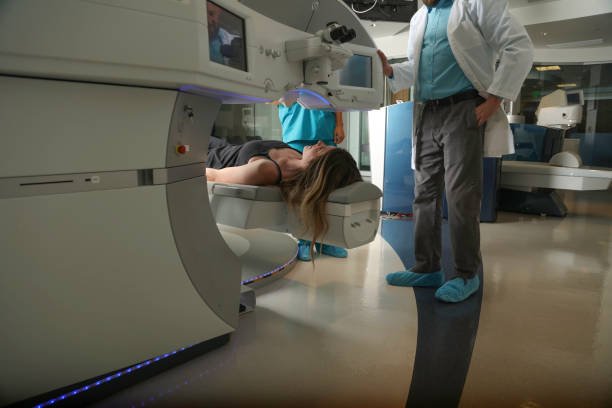Radiation therapy for breast cancer: What you need to know
Radiation therapy, or radiotherapy, is a standard treatment for breast cancer. This therapy uses high-energy particles or waves, such as X-rays, gamma rays, electron beams, or protons, to destroy or damage cancer cells.
Radiation therapy is most commonly given after breast-conserving surgery or lumpectomy to help reduce the risk of cancer returning to the same breast. It might also be recommended after a mastectomy (removal of the entire breast), especially if the breast cancer is large or involves the lymph nodes.
When it's used: Radiation therapy can be used at different stages of breast cancer treatment. For early-stage or non-invasive breast cancer, it's often used after lumpectomy (breast-conserving surgery) to eliminate any remaining cancer cells. Advanced breast cancer may be used after mastectomy (surgical removal of the entire breast) to manage cancer that has spread to other parts of the body or to reduce the tumor size before surgery.
Types of Radiation Therapy: There are two primary types of radiation therapy used in breast cancer treatment: external beam radiation and internal radiation, or brachytherapy.
External beam radiation (EBRT): It is the most common type. A machine directs a radiation beam to the area needing treatment during this treatment. It is usually given over a period of three to six weeks, five days a week. Sessions typically last less than 30 minutes. Radiation is designed to target the tumor and immediate surrounding tissue.
Brachytherapy: It involves inserting radioactive material inside the body near the cancer. There are two types of brachytherapy: interstitial, where small radioactive pellets are placed in the breast tissue, and intracavitary, where a balloon catheter delivers radiation directly to the surgical cavity.
Procedure: Before starting treatment, you'll undergo a planning session (simulation) where detailed chest images are taken to determine the precise angles for aiming the radiation beams. Shields may be used to protect surrounding tissue and organs from radiation.
Maintaining open communication with your healthcare team throughout the treatment process is crucial. They can provide helpful advice on managing side effects, including tips for skin care, dietary changes to combat fatigue, and exercises to reduce the risk of lymphedema.
Side Effects: Most side effects are temporary, including fatigue, skin changes (like a sunburn), swelling in the breast or arm, and a slight darkening of the skin color of the treated area. Long-term effects can include changes to the texture or appearance of the breast, heart problems (especially if the left breast was treated), and a minimal risk of developing a second cancer.
Aftercare: Regular follow-up appointments are necessary to monitor healing and any potential side effects of radiation. This is an opportunity to discuss any concerns or symptoms with your doctor. A well-balanced diet and moderate exercise can aid recovery and manage side effects.
Psychological Impact: Facing breast cancer and its treatment can lead to anxiety and emotional distress. Support from mental health professionals, support groups, and loved ones can be highly beneficial during this challenging time.
Personalized Treatment: Every case of breast cancer is unique, and the approach to treatment should be personalized. Discuss with your doctor your specific situation, potential side effects, the benefits, and risks of radiation therapy, and other options.
Conclusion: Radiation therapy is a standard and effective treatment for breast cancer that can be used in different situations to increase survival and alleviate symptoms. It does come with potential side effects and risks, which should be discussed thoroughly with your healthcare provider. JIET Hospital ensures a holistic, patient-centered approach to breast cancer radiation therapy. By combining top-tier technology with personalized care plans and a comprehensive support system, JIET Hospital sets a high standard for cancer treatment in the healthcare industry. To consult with our team and to learn more about radiation therapy for breast cancer at JIET Hospital, you can make an appointment through our website or by calling our helpline. Our Patient Services team is ready to guide you through appointment scheduling, ensuring you have all the information you need.




